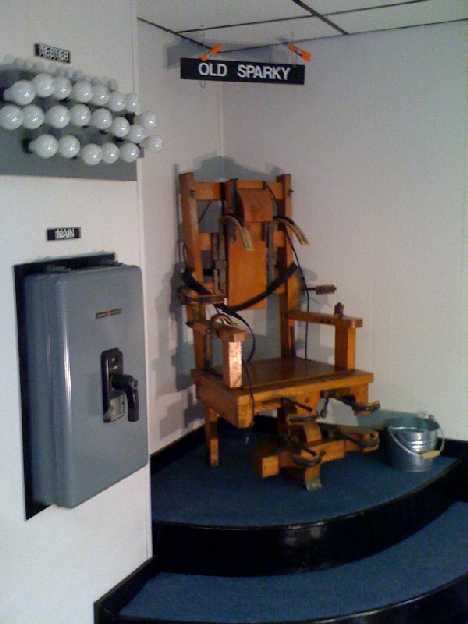
Governor Signs Electric Chair Bill into Law
**Almost a Viral VIDEO**
Skippy Massey
Humboldt Sentinel
“There are states that allow inmates to choose, but it is a very different matter for a state to impose a method like electrocution. No other state has gone so far.”
~Richard Dieter, Death Penalty Information Center
 Old Sparky is back.
Old Sparky is back.
Tennessee has decided how it will respond to a nationwide scarcity of lethal injection drugs for death-row inmates: with the electric chair.
Republican Gov. Bill Haslam signed a bill into law Thursday allowing the state to electrocute death row inmates in the event prisons are unable to obtain the drugs, which have become more and more scarce following a European-led boycott of drug sales for executions.
Tennessee lawmakers overwhelmingly passed the electric chair legislation in April, with the Senate voting 23-3 and the House 68-13 in favor of the bill.
Tennessee is the first state to enact a law to reintroduce the electric chair without giving prisoners an option, said Richard Dieter, executive director of the Death Penalty Information Center, a Washington, D.C.-based nonprofit organization that opposes executions and tracks the issue.
Dieter said he expects legal challenges to arise if the state decides to go through with an electrocution, both on the grounds of whether the state could prove that lethal injection drugs were not obtainable and on the grounds of constitutional protections against cruel and unusual punishment.
 Republican state Sen. Ken Yager, a main sponsor of the electric chair measure, said in a recent interview that he introduced the bill because of “a real concern that we could find ourselves in a position that if the chemicals were unavailable to us, we would not be able to carry out the sentence.”
Republican state Sen. Ken Yager, a main sponsor of the electric chair measure, said in a recent interview that he introduced the bill because of “a real concern that we could find ourselves in a position that if the chemicals were unavailable to us, we would not be able to carry out the sentence.”
The decision comes as lethal injection is receiving more scrutiny as an execution method, especially after last month’s botched execution in Oklahoma.
In that case, convicted killer Clayton Lockett, 38, began writhing, clenching his teeth and straining to lift his head off the pillow after he had supposedly been rendered unconscious by the first of three drugs in the state’s new lethal injection combination.
The execution was halted, and Lockett died of an apparent heart attack 10 minutes later, authorities said. They later blamed a collapsed vein, not the drugs themselves.
Concerns about lethal injection also have risen at a time when Tennessee and many states — including Oklahoma, Missouri and Texas — obtain execution drugs in secret from unidentified compounding pharmacies. Death penalty opponents say the secrecy raises the risk of something going wrong.
 A Vanderbilt University poll released this week found that 56 percent of registered voters in Tennessee support use of the electric chair, while 37 percent are against it.
A Vanderbilt University poll released this week found that 56 percent of registered voters in Tennessee support use of the electric chair, while 37 percent are against it.
Tennessee has 74 prisoners on death row. Sidney Porterfield, who at 71 was the oldest inmate on Tennessee’s death row, died of natural causes this week. Nine others have died of natural causes since 2000, while one committed suicide. Six inmates have been executed during that time frame, the most recent in 2010.
Thirty-two states have the death penalty, and all of them rely at least in part on lethal injection. The federal government also uses lethal injection but rarely carries out executions.
The Supreme Court has never declared a method of execution unconstitutional on the grounds that it is cruel and unusual. It upheld the firing squad in 1879, the electric chair in 1890 and lethal injection in 2008.
The court made it clear over the years that the Eighth Amendment prohibits inflicting pain merely to torture or punish an inmate, drawing a distinction between a method like electrocution and old European practices such as drawing and quartering. The Constitution prohibits “unnecessary and wanton infliction of pain,” the court said in 1976.
 First used by New York State in 1890, the electric chair was employed throughout the 20th century to execute hundreds and is still an option in eight states. Since 1976, 158 inmates have been executed by electrocution. It was considered humane when it was first introduced but has resulted in many horrific executions over the years.
First used by New York State in 1890, the electric chair was employed throughout the 20th century to execute hundreds and is still an option in eight states. Since 1976, 158 inmates have been executed by electrocution. It was considered humane when it was first introduced but has resulted in many horrific executions over the years.
In 2000, Florida switched from the electric chair to injection after bungled electrocutions raised concerns that the state’s death penalty would be declared unconstitutional.
For Tennessee however, if you can’t beat ‘em, you might as well join ‘em. Old Sparky’s made a comeback for the modern age.
~Google News/Eric Goodchild/Web Urbanist
Please feel free to share us with others
and follow us on Twitter and Facebook


















